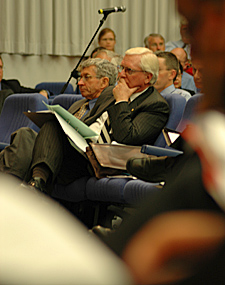 With a gracious nod, Standing Committee member Warwick Olsen accepted the Rev Neil Flower's adjustment to a land-mark amendment that will put Anglican Media back in the business of evangelising Sydney's unchurched masses.
With a gracious nod, Standing Committee member Warwick Olsen accepted the Rev Neil Flower's adjustment to a land-mark amendment that will put Anglican Media back in the business of evangelising Sydney's unchurched masses.
Last night Synod met to consider the Appropriations and Allocations Ordinance that distributes the diocese' financial resources for the next three years.
Mr Olsen quickly moved to the centre of the evening's debate, asking for a portion of funds that had been locked away for the publishing of prayer books to be put to work creating evangelistic television programs.
“My ammendment I am proposing will fund public media ministry,” Mr Olsen told the synod.
“My proposal does not take money from another ministry in the budget, but uses profits made by Anglican Media when it published the green prayer book in the 1970’s,” he noted.
“I think it’s time to release the money for media ministry now; it’s been hanging around too long.”
He informed synod Anglican Media’s last late-night audience shares still amounted to ‘more than all of the people who meet in Anglican churches each Sunday’.
“We need to make no mistake - once we give television opportunities away, there will be no getting them back.”
Synod quickly resolved that the funds be freed up, but clergy and laity lined the aisles to suggest more effective ways of evangelising the public.
“The reason we are getting bad TV times is that free to air television is losing viewers as they move to do other things,” pointed out Malcolm Purvis from Berala.
“My son spends more time surfing the Internet than watching television - and he’s four!”
Veteran television and radio journalist, Andrew Robertson, says the industry is well aware the television ship is sinking.
“Television’s days of dominance are coming to an end. The Internet is the future,” Mr Roberston says.
“The choice for us is position ourselves for the future, or spend our money on a medium that is still very dominant, but fading. Sports bodies like the AFL are already examining putting their events down the Internet rather than broadcasting free to air.”
However others suggest the power of the small screen shouldn't be so quickly dismissed.
Standing Committee member Bill Nicholson emphasised the present realities of home life.
“Notwithstanding the great influence of the web and other technologies, TV is still the easiest thing to turn on,” he says.
“There are large areas of Sydney that are not really represented by the bulk of us here,” warned Dr Barry Newman.
“And the reality is that those people are not involved in the web - if you go by their homes you will find TV aerials.”
It was the rector of Thornleigh-Pennant Hills who voiced the common thread.
“I do believe we must reach people,” Mr Flower said, touching on the desire to evangelise. “Particularly those battlers watching re-runs of re-runs.”
“But if we ammend this motion to remove the word ‘television’, we can have the best of both worlds. We open up a whole new world for the Anglican Media Council for them to start experimenting in. They can still do some stuff for TV, but they can also get to where the new media is.”
With a flurry of hands and the flourish of a pen synod altered the amendment to permit Anglican Media to use the funds for the more general purpose of the ‘production of programs and material for public media'.
The amendment, passed by synod, is set to deliver Anglican Media an additional $150-$160,000 a year for the next three years.
In 2003 Anglican Media had to relinquish almost all of its media evangelism due to significant funding cuts.
But CEO Allan Dowthwaite says the organisation has never stepped back from believing in the power of the media to effect change in society.
"The popular media has always been a powerful tool for influencing people's attitudes and world-views. That's why this Diocese started using television right from its introduction. And we should thank God for what he has enabled us to achieve through it,” he says.
“But, I firmly believe that the Internet is the medium of the future " a future that is not too far off " and it's imperative that we develop our use of it. This decision by synod gives us the opportunity to do both for the next three years, which in the end is a great win for the gospel."



























